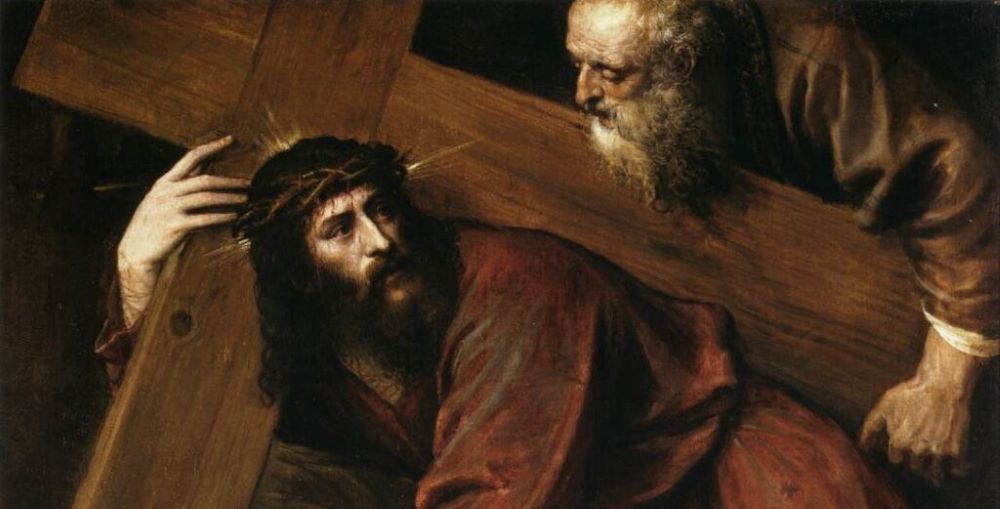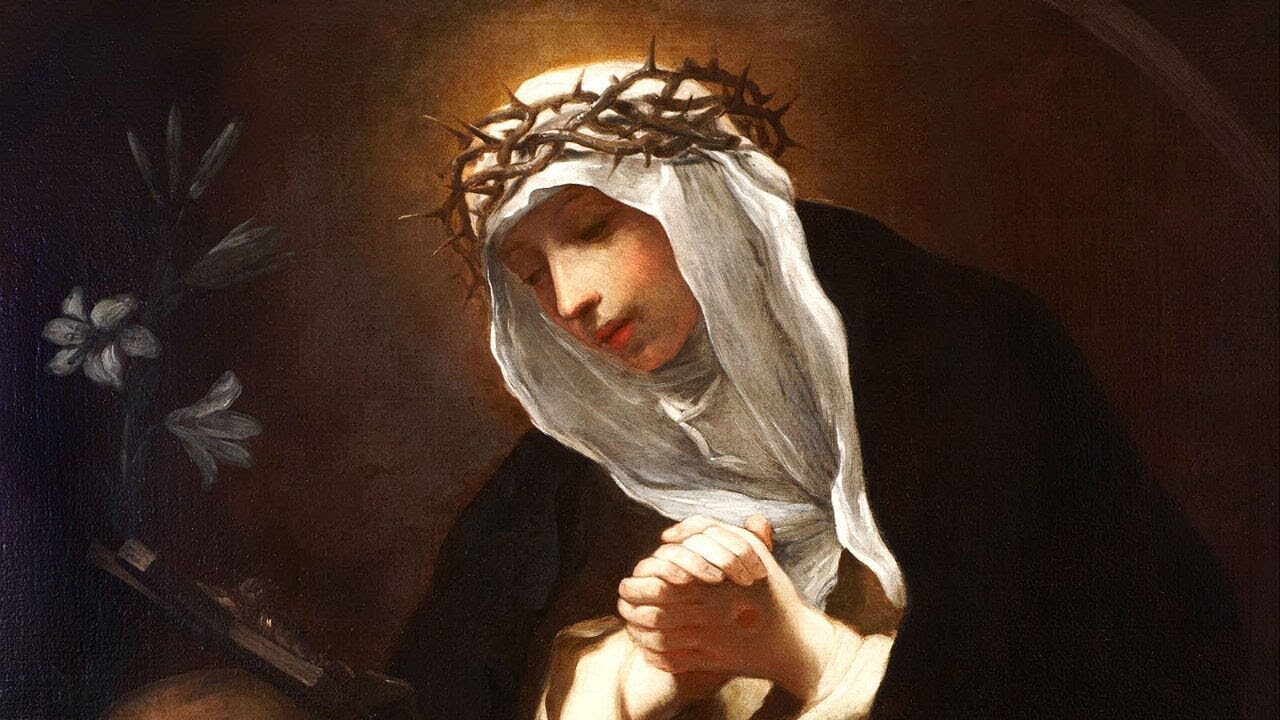
Perfect humanity will be, within its limits, a perfect reflection of the Creator.
Fr. Christopher Rengers, O.F.M. Cap., 35 Doctors of the Church
St. Catherine of Siena (Feast Day April 29) epitomizes this truth. In learning more about her, we have the opportunity to learn more about ourselves.
The Great Saint Catherine
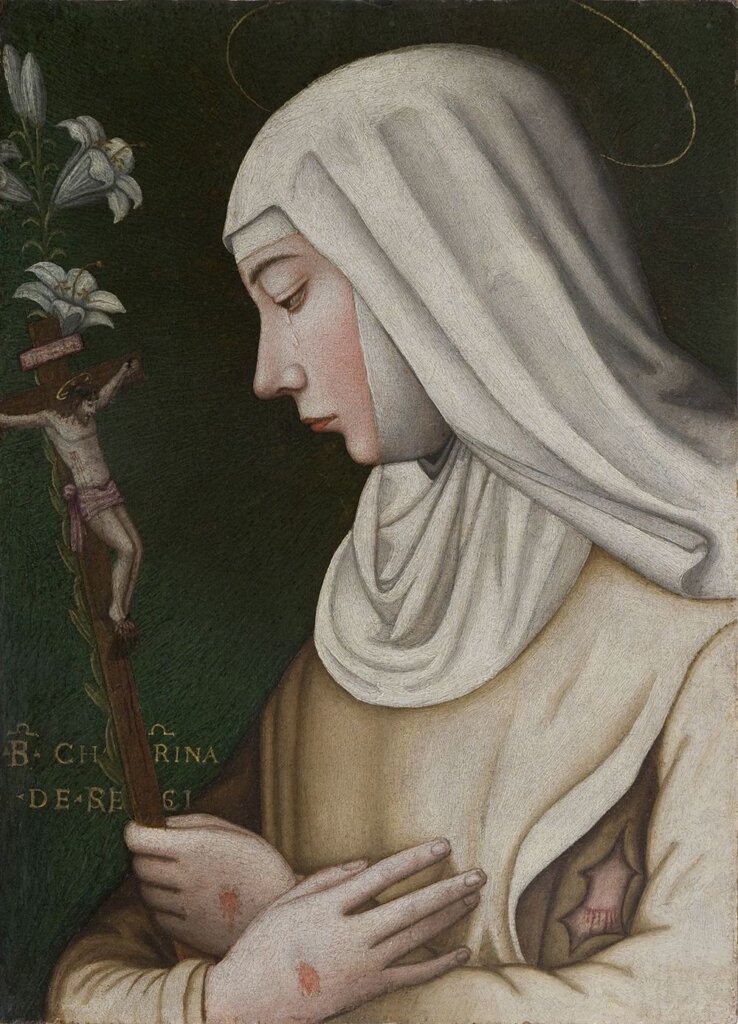
St. Catherine, who lived from 1347-1380, came as close as humanly possible to living out her humanity in Christlike ways. This makes her the ideal mentor for those of us still on our earthly journey. In this article, I’ll be focusing on the beauty of what St. Catherine left us in terms of her writings, but if you would like to read more about her life you can read the biography written by her spiritual director here.
In 1970, Pope Paul VI declared her a Doctor of the Church and called her success in bringing the papacy back to Rome from Avignon “the masterpiece of her work.” While the action of persuading Pope Gregory XI to come to Rome was a courageous feat—as were her other accomplishments—it is her message to her fellow Christians that is, perhaps, her most beloved legacy.
St. Catherine left numerous writings which can be classified under three headings: Prayers, Letters, and The Dialogue. Believe it or not, this brilliant woman was quite illiterate and could not read or write. She wrote a few “miraculously” formulated letters on her own, but her “writings” were usually dictated to others after her many ecstasies.
I recently finished reading The Dialogue (it is quite long!) and was profoundly touched by the deep, intimate relationship between Catherine and God. It took me a while to get used to the dialogue style, but I was soon drawn into the heartfelt conversation between this saint and her Lord.
At the end of her life, she entrusted her confessor with what she referred to simply as “my book.” This “book” eventually received the title The Dialogue, by which it is known today.
Although it comes to us from the 12th century, The Dialogue deals with concepts that are familiar to all of us in the Christian life. Yet there were moments in which it felt as though I were discovering them for the first time.
This amazing book outlines the spiritual life as a path to God through Jesus Christ, who is the Bridge. Many virtues are mentioned as necessary for our salvation, but three of them struck me as important for us today because they particularly contradict what the world values. These virtues are: 1) surrender of self-will, 2) discretion, and 3) detachment.
St. Catherine reminds us that virtue stems from knowledge of self and knowledge of God. This basic truth—that we need to know ourselves for who we are and know God for who He is—is a major theme of The Dialogue and is crucial to understand if we want to live a life united to Christ.
1. Surrender of Self-Will

St. Catherine reminds us that we, as weak and finite human beings, cannot love God the way He deserves. This all-important truth guides everything St. Catherine writes.
In recognizing Our Lord’s perfection, we in turn see our own weakness—which St. Catherine says is key to coming face to face with a true knowledge of who we are.
“[I]n the knowledge which the soul obtains of herself, she knows more of God, and knowing the goodness of God in herself, the sweet mirror of God, she knows her own dignity and indignity. Her dignity is that of her creation, seeing that she is the image of God, and this has been given her by grace, and not as her due. In that same mirror of the goodness of God, the soul knows her own indignity, which is the consequence of her own fault. Wherefore, as a man more readily sees spots on his face when he looks in a mirror, so, the soul who, with true knowledge of self, rises with desire, and gazes with the eye of the intellect at herself in the sweet mirror of God, knows better the stains of her own face, by the purity which she sees in Him.”
The Dialogue
This self knowledge brings humility. Realizing the true nature of our soul—both our “dignity and indignity”—reveals our reliance on God. We will begin to desire more and more as we see ourselves for who we are and our Creator for who He is.
St. Catherine’s biography, written by her spiritual advisor, revealed that she once pleaded with God because she wanted everyone to be saved. St. Catherine’s spirit wrestled with God “as had Jacob and Abraham.” Although she knew that damned souls were following their own perverse wills, she experienced sorrow and frustration that her prayers and her offerings couldn’t prevent their eternal loss.
She cried out to God, but He did not answer. Finally she asked Him:
‘Tell me Lord, who am I, what am I? Lord, tell me also, who and what art Thou? The answer that came back burned in her memory forever the distance between the Creator and the creature. ‘Daughter, thou art she who is not. I am He who is.'”
Fr. Christopher Rengers, O.F.M. Cap., 35 Doctors of the Church
The Dialogue goes on to say that even our most intimate, sincere, sacrificial contrition does not make up for the sins against Our Lord. God sent His Son to make up for the sins of the world; Jesus is the Bridge by which we must cross to obtain our salvation. Since we cannot rely on our own merits, we must rely on the goodness of God.
Our Lord also tells St. Catherine that we can show God our love by loving our neighbor. It is through others—especially those closest to us and those we find difficult to love—that we can reveal to God our love for Him.
This plain and simple teaching struck me as profound. When we struggle to love our family members or coworkers or others who we deal with on a day-to-day basis, we can remember that loving them is a way to express our love for Christ. Remembering that we are doing it for Him can be a huge help in laying aside our self-will for the benefit of someone else.
“I ask you to love me with same love with which I love you. But for me you cannot do this, for I love you without being loved. Whatever love you have for me you owe me, so you love me not gratuitously but out of duty, while I love you not out of duty but gratuitously. So you cannot give me the kind of love I ask of you. This is why I have put you among your neighbors: so that you can do for them what you cannot do for me–that is, love them without any concern for thanks and without looking for any profit for yourself. And whatever you do for them I will consider done for me.”
The Dialogue
Since we express our love for God through our neighbor, we must love our neighbor as best we can. That is why self-knowledge should be an essential desire for each of us, since Our Lord tells St. Catherine that it is only through knowledge of self and knowledge of God that we are able to put aside of our self-will and love those around us.
If we would see the stars of His mysteries, we must first descend into the deep well of humility; for the humble soul casts herself upon the earth in acknowledgment of her own baseness, and then God raises her up.
Excerpt from a letter to Bl. Raymond Capua, confessor to St. Catherine
What we see and hear in the world today contradicts this holy goal of humility through self-knowledge. We are encouraged, through social media and other avenues and channels, to promote ourselves.
But it is God’s will, not our will, that we should be striving for.
One way to remind ourselves of this is to memorize a verse of Scripture or a short “arrow prayer” that we can say quickly to ourselves throughout the day. A few of my favorites are “Lord, I do believe, help my unbelief” “Jesus I trust in You” “Not my will, but Yours be done” and “Jesus Christ Son of God, have mercy on me, a sinner” (The Jesus Prayer). Any prayer can become an arrow prayer. They can be “shot up to God” at a moment’s notice. The devil hates arrow prayers because they reveal the faith of the one saying them!
Another spiritual help is to ask God for a true vision of ourselves. (But don’t be surprised when what you see isn’t what you think you know about yourself -trust me on this one!).
2. Discretion
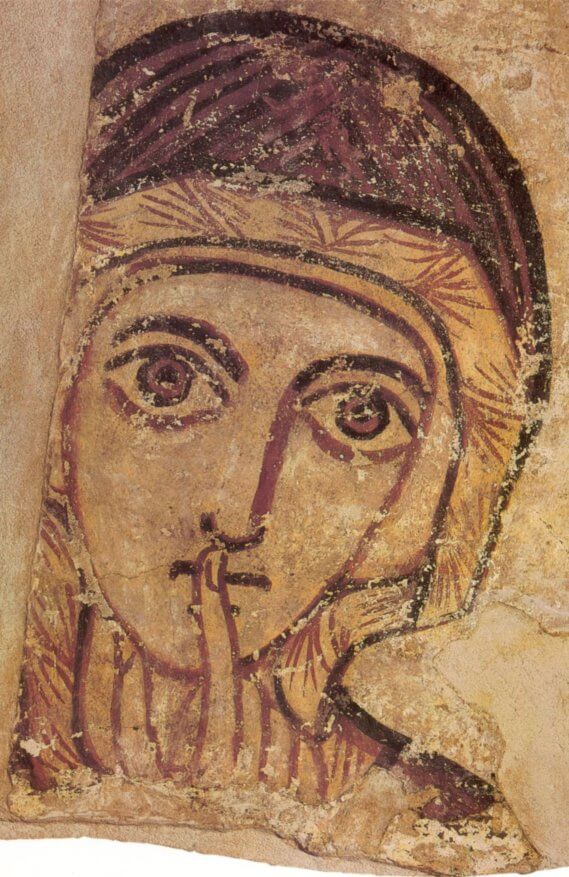
“Discretion” isn’t a well known virtue, but its value in the spiritual life is immense.
Most of us think of discretion as the ability to avoid words, actions, or attitudes which could result in offensive or undesirable consequences. Yet St. Catherine reveals to us that discretion is found by rendering to God what He is due and, in turn, making the most of the graces we receive from Him.
An entire section of The Dialogue is dedicated to this theme of discretion. At first I struggled to comprehend how I might develop this virtue in my own life. But it helped me to contemplate what the opposite of discretion means.
In The Dialogue, Our Lord says to St. Catherine:
“An indiscreet soul robs Me of the honor due to Me, and attributes it to herself, through vainglory, and that which is really her own she imputes to Me, grieving and murmuring concerning My mysteries, with which I work in her soul and in those of My other creatures; wherefore everything in Me and in her neighbor is cause of scandal to her. Contrariwise those who possess the virtue of discretion. For, when they have rendered what is due to Me and to themselves, they proceed to render to their neighbor their principal debt of love, and of humble and continuous prayer, which all should pay to each other, and further, the debt of doctrine, and example of a holy and honorable life, counseling and helping others according to their needs for salvation, as I said to you above. Whatever rank a man be in, whether that of a noble, a prelate, or a servant, if he have this virtue, everything that he does to his neighbor is done discreetly and lovingly, because these virtues are bound and mingled together, and both planted in the ground of humility which proceeds from self-knowledge.”
The Dialogue
Discretion is based on a true knowledge of ourselves and of God. When we properly understand who we are in relation to Our Lord, we can acknowledge that our neighbor, too, is a child of God and deserves to be treated as such. Not only our neighbor, but also all that happens to us, should be seen as coming from Our Lord and therefore accepted with love for Him:
“Whatever happens to you, never think that it comes from men, think that it comes from God and is for your own good. And then see how you may profit from it.”
From an excerpt of a letter written by St. Catherine to her sister
As an extrovert, I sometimes catch myself saying too much. After considering a conversation in hindsight, I often wish I had held my tongue. After reading about discretion and understanding what Our Lord said to St. Catherine about “creatureliness”—that we are creatures and He is the Creator—I hope that I can always remember this essential truth in my conversations and in my relationship with others.
One practical way to foster this virtue might be to say the words of St. John the Baptist silently to ourselves in the midst of our day to day conversations with those around us: “Christ must increase and I must decrease.” These simple words remind us that we are God’s servants on this earth and we must put aside our own pride in dealing with the “neighbors” God has placed in our lives.
Like so many of the virtues, discretion is grounded in humility:
Because otherwise the tree would not produce the virtue of discretion, or any fruit of life, if it were not planted in the virtue of humility, because humility proceeds from self-knowledge. And I have already said to you, that the root of discretion is a real knowledge of self and of My goodness, by which the soul immediately, and discreetly, renders to each one his due.
The Dialogue
I had not thought much about discretion before reading the works of St. Catherine of Siena, but I am grateful for having learned about this little-known virtue.
When we remember that it is the present moment in which we are to live as Christians, discretion can be a spiritual help. We cannot live in the past since it is no longer here…we cannot live in the future because it does not yet exist…so in our present moments (in the here and now) we can practice the virtue of discretion and live in what St. Catherine calls the “cell of self-knowledge” (I love that image) which is a place she describes as “sweet delight.”
3. Detachment
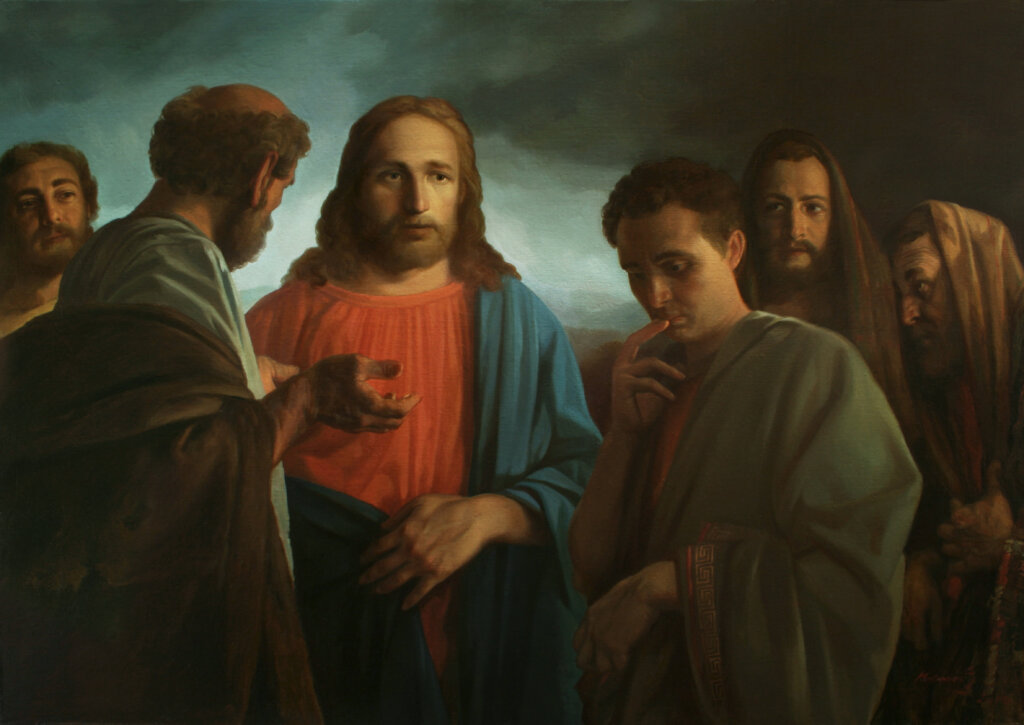
In his book Meditations on Christ: Model of God, Romano Guardini says: “One of the most profound paradoxes of life is the fact that a man becomes more fully himself the less he thinks of himself.”
Although this seems like a simple truth, it is not easy to accomplish. We have many attachments, not only in material things, but even in those we love, and our attention or devotion to them can become disordered. One of the ways this has become clear to me is as a mother.
Naturally, I love my children and want the best for them. Yet sometimes what I think is best for them is not what God has in mind for them.
For instance, as our older children have considered colleges, my husband and I have discovered over the years that it is easy to become influenced by the culture and by what the world perceives as prestigious. Yet in helping our children discern where to attend a college or what their vocation might be, we have had to learn to put aside what we might desire for them, and encourage them to ask God where it is He wants them, both now and in their future. This can be difficult, until we remember that all of us will only be truly happy in this life when we are doing the will of God.
We all have attachments in this life. Again, St. Catherine tells us that we can place things in their proper order when we stay “in the cell of self-knowledge” wherein we learn to place our trust in God’s Providence. Her understanding of her own status helped her to see the need for complete detachment from creatures in order to appreciate “the joy that comes from union with the Creator.”
She often wrote to others about detachment as a means to grow closer to Christ. In a letter addressed to Countess Bianchina, she warned her about the dangers of attaching herself to those things that do not draw her to Jesus:
We go on always forming new attachments; if God cuts off one branch, we make another. We fear to lose perishing creatures more than to lose God. And so, keeping them and possessing them against the will of God, we taste even in this life the foretaste of Hell: For God so permits that a soul which loves itself with irregular love should become insupportable to itself. It suffers from everything that it possesses because it fears to lose it; and to preserve what it possesses, there is anxiety and fatigue day and night. And it suffers from what it does not possess, because it desires what it cannot get. And so the soul is never at rest in the midst of the things of this world, for they are all less than us. They were made for us, we were not made for them. We were made for God alone to enjoy His eternal and sovereign happiness. God alone then, can satisfy the soul; and all that it can desire it will find in Him.
Excerpt from a letter to Countess Bianchina by St. Catherine
One way that we might grow in the habit of detachment is to consider how much we love God. Even in our homes, we can see that material things get in the way of giving glory to God.
St. John of the Cross said that God will rush more closely to the detached soul. When I think of it in this way, it helps me to become more intentional about my “attachments” and to judge my perceptions of them more routinely so as to guard against becoming too attached to something or someone. Since reading The Dialogue, I’ll ask myself the question, “To what am I disorderly attached?” I can also use this list of attachments to prepare myself for confession.
My Gratitude to St. Catherine of Siena
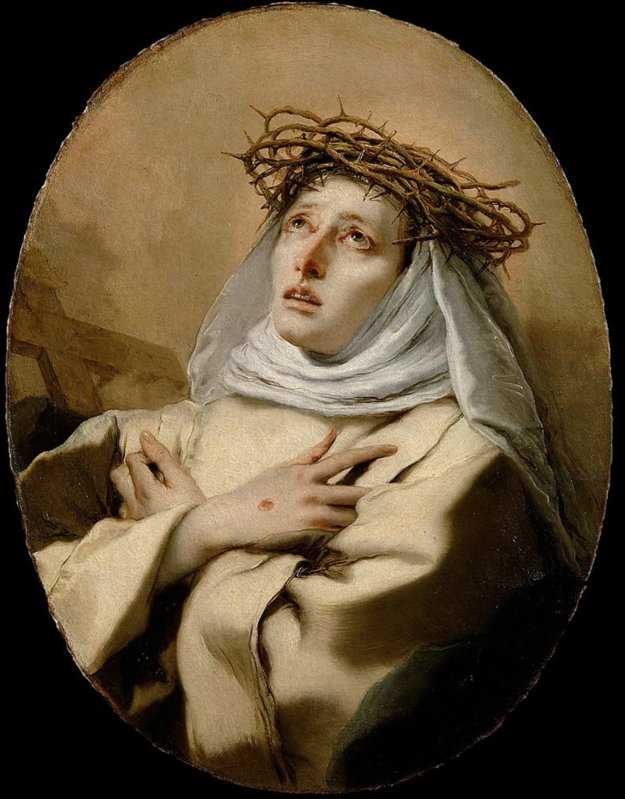
Fr. Christopher Rengers says that it is in studying those closest to Christ that we come to understand Our Lord and to follow Him more closely. He said that in reading and learning about the saints we also “learn how completely He can fill a human life and fulfill the yearnings and strivings of our human heart.”
Sometimes I make the mistake of reading about a saint and looking at their life as I would a person in a history book. In other words, I read about a saint and I miss their message.
The Dialogue has helped me to understand St. Catherine in ways I never would have if I simply learned about her in an objective way. In looking at her writings, I’ve come to recognize that she has the same message today that she had for those living in her own century.
St. Catherine in a particular way shows us the Heart of Christ in the world today, for like our own era, her age was one of trial and change in the Church.
Fr. Christopher Rengers, O.F.M. Cap., 35 Doctors of the Church
I am grateful to St. Catherine for teaching us to reject all that is lesser and choose instead to love the Creator. She has helped me to see that by entering the “cell of self-knowledge” I am granted all-important insight into a knowledge of who God is…and who I am not.
Let us turn to St. Catherine as intercessor and mentor on our spiritual journey!
St. Catherine of Siena, pray for us!


